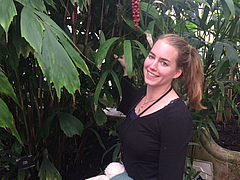iDiv research centre continues to grow – Dutch evolutionary biologist sets up new junior research group

As of June, the Dutch biologist Dr Renske Emilie Onstein will head up a new “Evolution and Adaptation” junior research group at iDiv with offices and laboratories based in Leipzig’s Bio City. (Picture: private)
Leipzig. The German Centre for Integrative Biodiversity Research (iDiv) continues to grow. As of June, the Dutch biologist Dr Renske Emilie Onstein will head up a new “Evolution and Adaptation” junior research group with offices and laboratories based in Leipzig’s Bio City. Using flowering plants and fruit-eating animals, the botanist and her team will investigate how species originate and which factors influence this process. This knowledge is important to predict how biological diversity might adapt to global change.
Renske Onstein investigates interactions that occur between different organisms, such as between plants and fruit-eating animals. When such interactions, which have developed over long periods of time, are suddenly disrupted, it is to be expected that this will also have an impact on evolution. “I am interested in the effect that the extinction of giant lemurs had on the flora in Madagascar, for example,” explains Onstein. “Nowadays, only smaller relatives of these primates still exist. It is assumed that this has feedback effects on large fruit-bearing plants such as palm trees whose seeds are no longer dispersed by large animals. Have these palms trees found a replacement for the large primates? Has evolution created a solution to this problem over the last few centuries? Answers to these questions are important as they allow us to predict how biological diversity might adapt to current and future global change.” Onstein is also investigating the influence of plant traits, climate and vegetation on species numbers in various regions. The main focus will be on plants from tropical rainforests and Mediterranean climates. Tropical and Mediterranean biomes have the greatest species diversity, and they are distributed across various continents, which allows for comparing the evolutionary histories of plants in different regions. The genetic material of samples collected from all over the world will be analysed in the laboratory in Leipzig with the use of modern molecular biological techniques. The group is the twelfth research group and the fifth junior research group based at the iDiv core centre in Leipzig.
The leader of the new junior research group, Renske Onstein, most recently worked at the Institute for Biodiversity and Ecosystem Dynamics at the University of Amsterdam. She wrote her doctoral thesis on the evolutionary biology of flowering plants in the Cenozoic period at the University of Zurich where she was awarded her PhD with distinction. With a grant from the Swiss National Fund (SNF), she then went on to work at Paris-Sud University. Onstein specialised in flowering plants (Angiosperms) in regions ranging from tropical rainforests to Mediterranean ecosystems. She conducted research at a number of botanical gardens and carried out fieldwork in Africa, Asia, Australia, Europe and Latin America.
Interview with Renske Onstein
https://www.idiv.de/en/groups_and_people/core_groups/evolution_and_adaptation/interview_ro.html
Links
https://www.idiv.de/en/groups_and_people/core_groups/evolution_and_adaptation.html
https://onsteinison.wordpress.com/
Contact:
Dr Renske Onstein
Head of the junior research group Evolution and Adaptation
German Centre for Integrative Biodiversity Research (iDiv) Halle-Jena-Leipzig
Phone: +49 341 9733 -129
Web: www.idiv.de/en/groups_and_people/core_groups/evolution_and_adaptation.html
Tilo Arnhold
iDiv Media and Communications
Phone: +49 341 9733 -197
Web: www.idiv.de/en/groups_and_people/central_management/media_and_communications/contact.html
